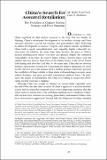| dc.contributor.author | Medeiros, Evan S. | |
| dc.contributor.author | Fravel, Maris Taylor | |
| dc.date.accessioned | 2011-01-13T20:04:06Z | |
| dc.date.available | 2011-01-13T20:04:06Z | |
| dc.date.issued | 2010-09 | |
| dc.identifier.issn | 0162-2889 | |
| dc.identifier.issn | 1531-4804 | |
| dc.identifier.uri | http://hdl.handle.net/1721.1/60548 | |
| dc.description.abstract | After exploding its first nuclear device in 1964, China did not develop sufficient forces or doctrine to overcome its vulnerability to a first strike by the United States or the Soviet Union for more than three decades. Two factors explain this puzzling willingness to live with nuclear vulnerability: (1) the views and beliefs of senior leaders about the utility of nuclear weapons and the requirements of deterrence, and (2) internal organizational and political constraints on doctrinal innovation. Even as China's technical expertise grew and financial resources for modernization became available after the early 1980s, leadership beliefs have continued to shape China's approach to nuclear strategy, reflecting the idea of assured retaliation (i.e., using the fewest number of weapons to threaten an opponent with a credible second strike). The enduring effect of these leadership ideas has important implications for the trajectory of China's current efforts to modernize its nuclear force. | en_US |
| dc.description.sponsorship | Smith Richardson Foundation | en_US |
| dc.description.sponsorship | United States Institute of Peace | en_US |
| dc.language.iso | en_US | |
| dc.publisher | MIT Press for the Belfer Center for Science and International Affairs, Harvard University | en_US |
| dc.relation.isversionof | http://dx.doi.org/10.1162/ISEC_a_00016 | en_US |
| dc.rights | Article is made available in accordance with the publisher's policy and may be subject to US copyright law. Please refer to the publisher's site for terms of use. | en_US |
| dc.source | MIT Press | en_US |
| dc.title | China's Search for Assured Retaliation: The Evolution of Chinese Nuclear Strategy and Force Structure | en_US |
| dc.type | Article | en_US |
| dc.identifier.citation | Fravel, M. Taylor, and Evan S. Medeiros. “China's Search for Assured Retaliation: The Evolution of Chinese Nuclear Strategy and Force Structure.” International Security 35.2 (2011): 48-87. © 2010 by the President and Fellows of Harvard College and the Massachusetts Institute of Technology. | en_US |
| dc.contributor.department | Massachusetts Institute of Technology. Department of Political Science | en_US |
| dc.contributor.department | Massachusetts Institute of Technology. Security Studies Program | en_US |
| dc.contributor.approver | Fravel, M. Taylor | |
| dc.contributor.mitauthor | Fravel, M. Taylor | |
| dc.relation.journal | International Security | en_US |
| dc.eprint.version | Final published version | en_US |
| dc.type.uri | http://purl.org/eprint/type/JournalArticle | en_US |
| eprint.status | http://purl.org/eprint/status/PeerReviewed | en_US |
| dspace.orderedauthors | Fravel, M. Taylor; Medeiros, Evan S. | en |
| dc.identifier.orcid | https://orcid.org/0000-0002-5831-8949 | |
| mit.license | PUBLISHER_POLICY | en_US |
| mit.metadata.status | Complete | |
